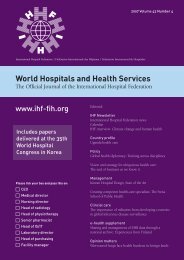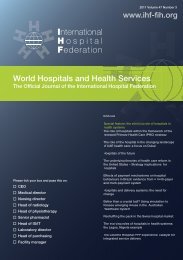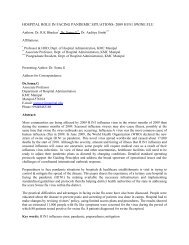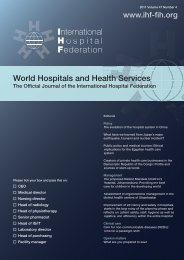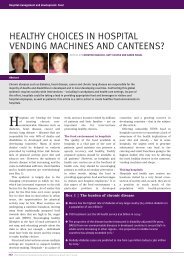World Hospitals and Health Services - International Hospital ...
World Hospitals and Health Services - International Hospital ...
World Hospitals and Health Services - International Hospital ...
Create successful ePaper yourself
Turn your PDF publications into a flip-book with our unique Google optimized e-Paper software.
E-HEALTH SUPPLEMENT: CANADIAN PERSPECTIVE<br />
high-needs aging population will be somewhat alleviated as<br />
cost savings are found through e-health. The ageing<br />
population will be better served by a reduction in repeated<br />
testing <strong>and</strong> drug interactions of inappropriate prescriptions<br />
that can be facilitated by an easily accessible electronic health<br />
record. They will benefit from a reduced requirement for longdistance<br />
travel for care, <strong>and</strong> may even be able to remain in<br />
their own homes longer, without the oft required move to<br />
centralised facilities for higher-needs late-life care.<br />
e-<strong>Health</strong> initiatives provide a means to overcome linguistic<br />
<strong>and</strong> cultural challenges to the health system. In some<br />
jurisdictions, governments are legally required to provide care<br />
in French <strong>and</strong> English, in others they provide some level of<br />
service in dozens of languages, <strong>and</strong> in others the immigrant<br />
populations suffer for the lack of language-appropriate<br />
services. Repeated clinical interviews <strong>and</strong> tests, multiple<br />
referrals <strong>and</strong> other repetitive, <strong>and</strong> perhaps unnecessary,<br />
contacts with the health system <strong>and</strong> professionals is a barrier<br />
to care for many whose French <strong>and</strong>/or English are limited.<br />
All manner of health care providers can benefit from e-<br />
health initiatives <strong>and</strong> the use of ICTs in clinical settings. e-<br />
<strong>Health</strong> can allow for access to patient records by pharmacists,<br />
sharing of information between clinicians <strong>and</strong> even between<br />
same-site facilities. Desktop <strong>and</strong> live online access to patient<br />
records, information that supports clinical decision-making,<br />
<strong>and</strong> health system information, such as online booking of<br />
specialists, along with a host of other possible uses of the new<br />
technologies will improve the clinical bench strength of<br />
providers, patients <strong>and</strong> the consumer. e-health technologies<br />
also allow for the development of continuing professional<br />
education for providers in isolated locales.<br />
e-<strong>Health</strong> reduces the stress on an often overburdened<br />
system. Seasonal swings in transmittable diseases, such as the<br />
flu, have led to crippling overuse of the emergency services in<br />
hospitals. e-<strong>Health</strong> mitigates this by providing a means for<br />
some out-of-hospital care, <strong>and</strong> by providing information on<br />
what is a condition requiring immediate emergency treatment<br />
via teletriage centres.<br />
Fiscal challenges are mitigated by ICTs <strong>and</strong> e-health<br />
developments that, as described above, reduce travel<br />
requirements <strong>and</strong> waiting times, increase cost- <strong>and</strong> risksharing,<br />
reduce replication <strong>and</strong> redundancy, improve positive<br />
outcomes, reduce overall system-management <strong>and</strong> patient<br />
costs, <strong>and</strong> improve the quality of information available outside<br />
of acute-care facilities.<br />
By increasing our capacity to meet unique geographic,<br />
population <strong>and</strong> political challenges, ICTs <strong>and</strong> e-health<br />
moderate the political debate <strong>and</strong> public concerns about the<br />
sustainability of the current health system.<br />
e-<strong>Health</strong> challenges<br />
Canada faces a number of challenges in the development of<br />
effective e-health solutions. Of primary concern is the inertia<br />
of traditional agendas <strong>and</strong> ways of doing things. Divisions<br />
between health professions, the public-private sectors,<br />
facilities, levels of government <strong>and</strong> cultural communities<br />
generally mitigate against large national inter-jurisdictional<br />
projects in the public sector <strong>and</strong> new large-scale investments<br />
in the health sector.<br />
The technologies themselves, as well as their deployment,<br />
are challenging matters. There are questions about how to<br />
automate the health-system properly, <strong>and</strong> the desktops of<br />
clinicians. Which technical st<strong>and</strong>ards are to be adopted? Is the<br />
current level of technology <strong>and</strong> technological sophistication of<br />
the providers <strong>and</strong> public sufficient to the task? What<br />
proprietary products will the public sector invest tax dollars<br />
in? How do we integrate the current system’s data ‘silos’?<br />
Some of the technologies remain unproven in extremes of<br />
climate <strong>and</strong> in far north locations of the earth’s surface. There<br />
are limitations imposed by the fragility <strong>and</strong> newness of certain<br />
technologies <strong>and</strong> products in situations where ongoing<br />
technical maintenance <strong>and</strong> operational services are next to<br />
non-existent.<br />
Other challenges include the development of a national<br />
‘infostructure’ to support inter-jurisdictional data sharing; the<br />
establishment of data <strong>and</strong> technical st<strong>and</strong>ards <strong>and</strong> health<br />
informatics systems; <strong>and</strong>, financial investments in technology<br />
<strong>and</strong> deployment. There are challenges with the education of<br />
sufficient numbers of informatics specialists to implement,<br />
operate, manage <strong>and</strong> continue the development <strong>and</strong><br />
improvement of the technologies <strong>and</strong> the system.<br />
Though Canada has claimed one of the highest Internet<br />
user rates in the world, this level of sophistication is not<br />
played out to the same degree across the country.<br />
Socioeconomic, cultural <strong>and</strong> geographic influences limit<br />
connectivity, performance <strong>and</strong> possibilities. Public <strong>and</strong><br />
professional acceptance of the new technologies in the place<br />
of old ways – such as, keying up a live online Internet<br />
consultation instead of sitting in a waiting room – is essential.<br />
An increasing concern with personal privacy <strong>and</strong><br />
information confidentiality <strong>and</strong> the recent proclamation of<br />
Privacy <strong>and</strong> Confidentiality legislation across the provinces<br />
<strong>and</strong> territories is a considerable challenge to the development<br />
of inter-jurisdictional data sharing arrangements <strong>and</strong> to storage<br />
<strong>and</strong> manipulation of data holdings (especially patient<br />
records).<br />
Clearly, large financial <strong>and</strong> human resources must be<br />
invested in e-health to realise the full potential of the<br />
technology. Actual expenditure on known Canadian e-health<br />
projects was a relatively low $31.7 million, in 1999-2000<br />
(Picot & Cradduck, 2000). Evidence suggests that e-health is<br />
at least ten years behind other information management<br />
intense sectors, such as banking.<br />
Meeting the challenges<br />
The Canadian health sector has positioned itself to address<br />
challenges to both the health system in general <strong>and</strong> to the<br />
development <strong>and</strong> implementation of e-health solutions. A<br />
number of initiatives <strong>and</strong> organisations have sprung up in the<br />
last decade to meet the challenges of geographic isolation,<br />
climate extremes, shifting population demographics, political<br />
dynamics, cultural differences, financial considerations,<br />
limitations imposed by technologies, lack of st<strong>and</strong>ards, low<br />
levels of automation in clinical settings <strong>and</strong> privacy <strong>and</strong><br />
confidentiality. Two organisations which are contributing<br />
much to the development of e-health in Canada are the<br />
Canadian Institute for <strong>Health</strong> Information (CIHI) <strong>and</strong> Canada<br />
<strong>Health</strong> Infoway.<br />
Vol. 40 No. 4 | <strong>World</strong> <strong><strong>Hospital</strong>s</strong> <strong>and</strong> <strong>Health</strong> <strong>Services</strong> | 33



